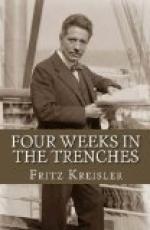To return to my narrative, the losses which my battalion suffered that day seemed extraordinarily small when compared with the accuracy of the Russian artillery’s aim and the number of missiles they fired. I counted seventy-four shrapnel that burst in a circle of half a mile around us in about two hours, and yet we had no more than about eighteen casualties. The most difficult part was to lie still and motionless while death was being dealt all about us and it was then and there that I had my first experience of seeing death next to me. A soldier of my platoon, while digging in the trench, suddenly leaned back, began to cough like an old man, a little blood broke from his lips, and he crumpled together in a heap and lay quite still. I could not realize that this was the end, for his eyes were wide open and his face wore the stamp of complete serenity. Apparently he had not suffered at all. The man had been a favorite with all his fellows by reason of his good humor, and that he was now stretched out dead seemed unbelievable. I saw a great many men die afterwards, some suffering horribly, but I do not recall any death that affected me quite so much as that of this first victim in my platoon.
II
The artillery duel died out with the coming of darkness and we settled down to rest, half of the men taking watch while the others slept. At five o’clock in the morning our regiment suddenly received the order to fall in, and, together with two other regiments, was drawn out of the fighting line. Our commanding general had received news that an isolated detachment on the extreme right wing of our army, about fifteen miles east of us, had been entirely surrounded by a strong Russian body, and we were ordered to relieve them. It must not be forgotten that our men had been under a most incredible strain for the last three days with barely any rest during the nights and not more than one meal a day. They had actually welcomed entering the firing line, as a relief from the fatigues of marching with their heavy burdens. It is curious how indifferent one becomes to danger if one’s organism is worn down and brain and faculty of perception numbed by physical exertion. It was, therefore, with badly broken-down strength that we started on this relief expedition, and it was good to see how unflinchingly the soldiers undertook their unexpected new task. All we had to say to our men was: “Boys, your brothers are needing you. They are cut off from all possible relief unless you bring it. Their lives are at stake, and as they are defending one of the most strategically important points—the right wing of our army—you can turn the tide of the whole battle in our favor; so go on.” And on they went, staggering and stumbling, and at the end of a few hours almost crawling, but ever forward.




